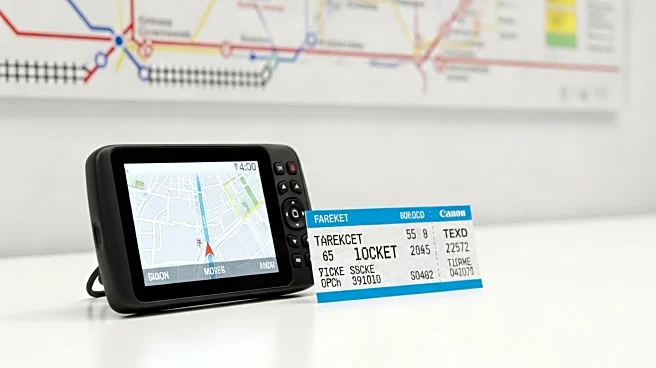What's Happening?
East Midlands Rail and Northern Rail are initiating a trial of a GPS-based pay-as-you-go ticketing system, aimed at simplifying fare calculations and offering passengers the lowest on-the-day prices for their journeys. East Midlands Rail has already begun the nine-month trial, seeking 4,000 volunteers to participate. The system requires passengers to use a mobile app to log their journey start and end points, with GPS technology detecting the stations. The app generates a barcode for ticket inspectors or barrier access. Participants will be charged a maximum of £23 per day or £72 per week, benefiting from single-leg pricing where single journeys cost half the return fare. Northern Rail will start a similar trial later this month on routes between Harrogate and Leeds, Sheffield and Doncaster, and Sheffield and Barnsley. The government is funding the trial with nearly £1 million, aiming to modernize the complex railway ticketing system.
Why It's Important?
This trial represents a significant step towards modernizing the railway ticketing system in England, making it more convenient and accessible for passengers. By utilizing GPS technology, the system aims to reduce the complexity of fare calculations and offer more flexible pricing options. This could lead to increased passenger satisfaction and potentially boost rail travel as a preferred mode of transportation. The initiative also aligns with broader efforts to integrate technology into public services, enhancing efficiency and user experience. If successful, the trial could pave the way for wider adoption of similar systems across the UK, influencing public transport policy and infrastructure development.
What's Next?
Following the trial, the government will assess the effectiveness and user feedback of the GPS-based ticketing system. If successful, there may be plans to expand the system to other routes and regions, potentially transforming the way rail fares are calculated and charged nationwide. Stakeholders, including rail companies and government agencies, will likely monitor the trial closely to determine its impact on passenger behavior and operational efficiency. Further developments could include enhancements to the app and integration with other transport services, fostering a more seamless travel experience.
Beyond the Headlines
The introduction of GPS-based ticketing raises questions about data privacy and security, as passengers' location data will be tracked and stored. Ensuring robust data protection measures will be crucial to maintaining public trust and compliance with privacy regulations. Additionally, the trial could influence broader discussions on the role of technology in public transport, potentially leading to innovations in other areas such as real-time travel updates and personalized journey planning.











